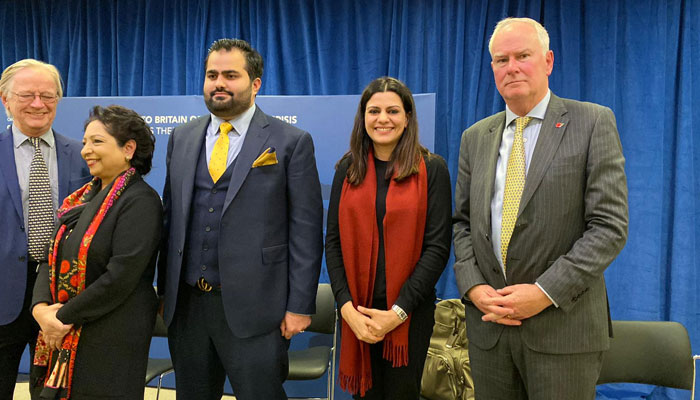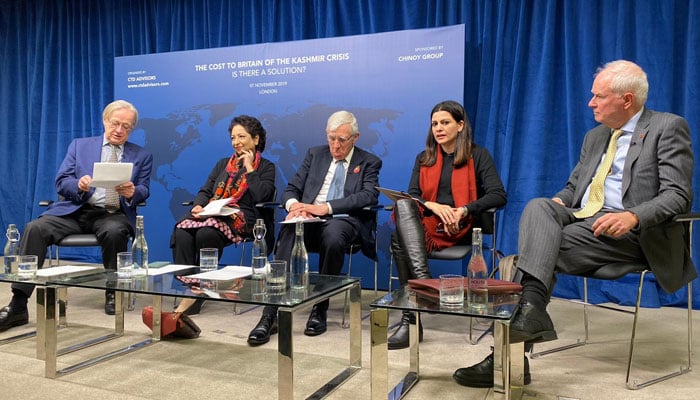Kashmir radicalisation threat to UK security
LONDON: Sir Mark Lyall Grant, Britain’s former National Security Adviser to prime ministers Theresa May and David Cameron, has warned that the issue of Indian Occupied Kashmir (IOK) poses security risks to the United Kingdom.
He said that increasing radicalisation amongst Kashmiris will have strong impact on nearly one million Kashmiris in Britain and India’s belligerence towards Kashmiris is a recipe of disaster. Sir Mark Lyall Grant was speaking alongside former foreign minister Jack Straw, Pakistan’s former ambassador to the United Nations Dr Maleeha Lodhi, NDTV journalist Nidhi Razdan and John Elliott of, former Financial Times who was based in India for 25 years till May 2019.
During a panel discussion entitled, “The Cost to Britain of the Kashmir Crisis: Is There a Solution?”, sponsored by entrepreneur Abdurrehman Chinoy of Chinoy Group and organised by strategic advisory group CTD Advisors at Chatham House in London. Experts fromIndia, Pakistan and Britain had a lively exchange against the backdrop of India’s revocation of the special status of occupied Jammu and Kashmir under Article 370 of the Constitution.
Sir Mark Lyall Grant warned that Narendra Modi’s actions in occupied Kashmir have increased threats for the UK security and has the potential of a huge cost for the UK government. The former National Security Adviser said that the current crisis in Kashmir risks increasing the level of radicalisation and extremism in Kashmir and “that has direct impact on British Kashmiris”. He said that 60 to 70 percent of over 1.5 million British Pakistani population is comprised of people from Azad Kashmir, mainly Mirpur and adjoining areas.
He told Geo News: “We have seen in history that diaspora is often more radical than the people who are left behind in their own homeland. So, I think there is a direct risk of radicalisation because of what Modi has done. There is also a potential financial cost to the UK, not just India and Pakistan, if indeed there is a nuclear confrontation between India and Pakistan.”
The former national security adviser to two prime ministers urged the British government to play its role.
He stressed, “UK has a responsibility because we were responsible for the partition in 1947 and Kashmir crisis is one of those outstanding crises form partition and that gives us a responsibility but also because of people-to-people link we have responsibility. We have always said that we are prepared to play a role in resolving this crisis but both have to agree. At the moment Pakistan agrees but India doesn’t.”
The panelists lamented the “missed opportunity” of Northern Ireland’s Good Friday Agreement like solution during the talks between former Indian prime minister Atal Bihari Vajpayee and former Pakistani president Pervez Musharraf in 2001 and another opportunity in 2006 when India and Pakistan came close to a solution of Kashmir.
Sir Grant said that Pakistan and India were close to a Good Friday like agreement and “it gave something to both sides”.
Jack Straw said that it was lamentable that as Pervez Musharraf got stuck with his own issues in Pakistan, India decided to back out of a solution instead of working with Musharraf to find a solution. “I am concerned about the plight of Muslims in Kashmir and don’t support what Modi has done in Kashmir by dividing Kashmir.”
The experts agreed that the international community does have a role in diffusing tension in Kashmir and an India-Pakistan dialogue could help arrive at a solution and lead towards a level of free exchange on both sides of the border and softening of all issues.
Dr Maleeha Lodhi said that India’s illegal annexation of Occupied Jammu and Kashmir has triggered multiple crises – a human rights crisis in the disputed territory, a humanitarian crisis, and a crisis in relations between Pakistan and India.
“This action, let us be clear, is a flagrant violation of several UN Security Resolutions. Let us also remember that there are 11 Security Council resolutions specifically on Kashmir. The promise of self-determination is enshrined in them. Let me cite just one provision as an example. Para 2 of Security Council Resolution 38 of 1948 states clearly that neither party can bring about any material change in the situation in Jammu and Kashmir. The India-Pakistan question has been on the UN agenda since the very inception of the dispute. It is among the oldest items on the UN agenda. It is on this basis that Pakistan – and China – asked for a meeting of the Council to discuss Jammu & Kashmir in the wake of India’s August 5 action. This took place, despite India’s opposition and lobbying – on August 16, 2019 for the first time in over 50 years. 1965 was the last time Kashmir was discussed.”
Lodhi told the audience that the lockdown and curfew, with its sweeping communications blackout is now three months old in Indian Occupied Kashmir, with no sign of abating. She added: “Despite the so-called information of blackhole, reports abound of widespread torture and arbitrary arrests, of how thousands including children have been picked up from their homes in midnight raids, of hospitals running out of critical supplies and turning instead into graveyards. Human rights organisations, Amnesty, Human Rights Watch, CPJ and others have continued to express concern and called on India to end the lockdown, release all political prisoners and detainees and ensure civil liberties to the people.”
Jack Straw said that what Prime Minister Modi has done by revoking Article 370 is outrageous and preposterous and seems not to have a strategy. He said that Pakistan has far less traction on this issue internationally because of India’s economic might. He said that he was alarmed to visit India and Pakistan, after Mumbai attacks, as the UK tried to stop both countries from going to war. He said he couldn’t believe that officials in India didn’t have any idea of what the fallout will exactly be like if there was a nuclear war and what will happen if India drops a nuclear warhead on Pakistan and how it will affect India and Bangladesh.
“There was a risk of nuclear conflict. UK and the United States tried to calm down both countries. It was alarming both countries neither had any idea what they were doing and didn’t know where to draw lines,” Straw said.
Journalist Nidhi Razdan criticised Indian government for the “unprecedented” communications curbs and curfew in Kashmir since the revocation of Article 370 in August and expressed hope that India would live up to its own values as a democracy. She said that Kashmiris feel deeply hurt that their identity has been snatched from them by the central government.
Nidhi Razdan said, “India radically altered the state of Kashmir. This was preceded by security lockdown, mass arrest of political activists and internet shut down. All top political leaders are still in preventive custody without having done anything unlawful. No violence has taken place after the revocation of Article 370. There is mass civilian disobedience, students have stayed away from classes, trade and industry is largely shut. It’s ironic that people in whose name these changes were carried were not consulted. People who held Indian flag are in detention. Kashmiris are still coming to terms with what has happened and they don’t know what future hold for them. India and Pakistan are not talking and prospects of talks in near future are dim.
Abdurreman Chinoy said that he organised the conference to bring together thinking heads from India, Pakistan and the UK to find a solution to the Kashmir issue. He said that Indian government must understand that revocation of Article 370 will not help India because the illegal annexation of Kashmir will further radicalise Kashmiris against India.
He said that panelists criticised both India and Pakistan for their approaches on Kashmir and provided their perspective but all agreed that situation in occupied Kashmir is untenable and that it’s India, which is not willing to talk while Pakistan has stayed away from war rhetoric.
Chinoy said that both Pakistan and India can realise their true potential only when they resolve all their outstanding issues through dialogue and peaceful negotiations.
-
 Kim Kardashian And Lewis Hamilton Make First Public Appearance As A Couple At Super Bowl 2026
Kim Kardashian And Lewis Hamilton Make First Public Appearance As A Couple At Super Bowl 2026 -
 Romeo And Cruz Beckham Subtly Roast Brooklyn With New Family Tattoos
Romeo And Cruz Beckham Subtly Roast Brooklyn With New Family Tattoos -
 Meghan Markle Called Out For Unturthful Comment About Queen Curtsy
Meghan Markle Called Out For Unturthful Comment About Queen Curtsy -
 Bad Bunny Headlines Super Bowl With Hits, Dancers And Celebrity Guests
Bad Bunny Headlines Super Bowl With Hits, Dancers And Celebrity Guests -
 Insiders Weigh In On Kim Kardashian And Lewis Hamilton's Relationship
Insiders Weigh In On Kim Kardashian And Lewis Hamilton's Relationship -
 Prince William, Kate Middleton Private Time At Posh French Location Laid Bare
Prince William, Kate Middleton Private Time At Posh French Location Laid Bare -
 Stefon Diggs Family Explained: How Many Children The Patriots Star Has And With Whom
Stefon Diggs Family Explained: How Many Children The Patriots Star Has And With Whom -
 ‘Narcissist’ Andrew Still Feels ‘invincible’ After Exile
‘Narcissist’ Andrew Still Feels ‘invincible’ After Exile -
 Shamed Andrew ‘mental State’ Under Scrutiny Amid Difficult Time
Shamed Andrew ‘mental State’ Under Scrutiny Amid Difficult Time -
 Bad Bunny's Super Bowl Halftime Show: What Time Will He Perform Tonight?
Bad Bunny's Super Bowl Halftime Show: What Time Will He Perform Tonight? -
 Where Is Super Bowl 2026 Taking Place? Everything To Know About The NFL Showdown
Where Is Super Bowl 2026 Taking Place? Everything To Know About The NFL Showdown -
 Chris Pratt Explains Why He And Katherine Schwarzenegger Did Premarital Counseling
Chris Pratt Explains Why He And Katherine Schwarzenegger Did Premarital Counseling -
 Drake 'turns Down' Chance To Hit Back At Kendrick Lamar At Super Bowl
Drake 'turns Down' Chance To Hit Back At Kendrick Lamar At Super Bowl -
 Sarah Ferguson Had A ‘psychosexual Network’ With Jeffrey Epstein
Sarah Ferguson Had A ‘psychosexual Network’ With Jeffrey Epstein -
 Miranda Kerr Shares The One Wellness Practice She Does With Her Kids
Miranda Kerr Shares The One Wellness Practice She Does With Her Kids -
 Czech Republic Supports Social Media Ban For Under-15
Czech Republic Supports Social Media Ban For Under-15





